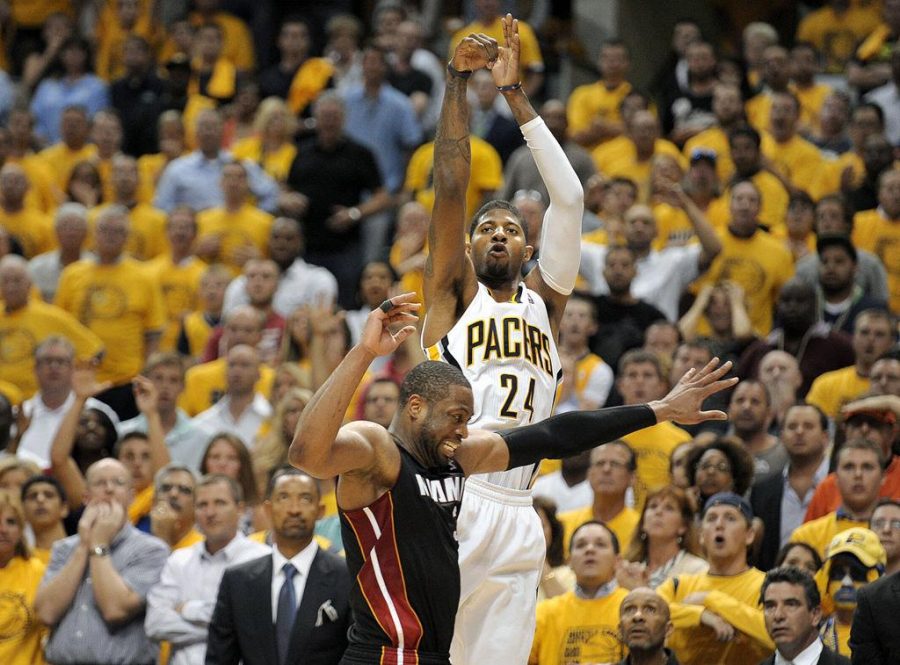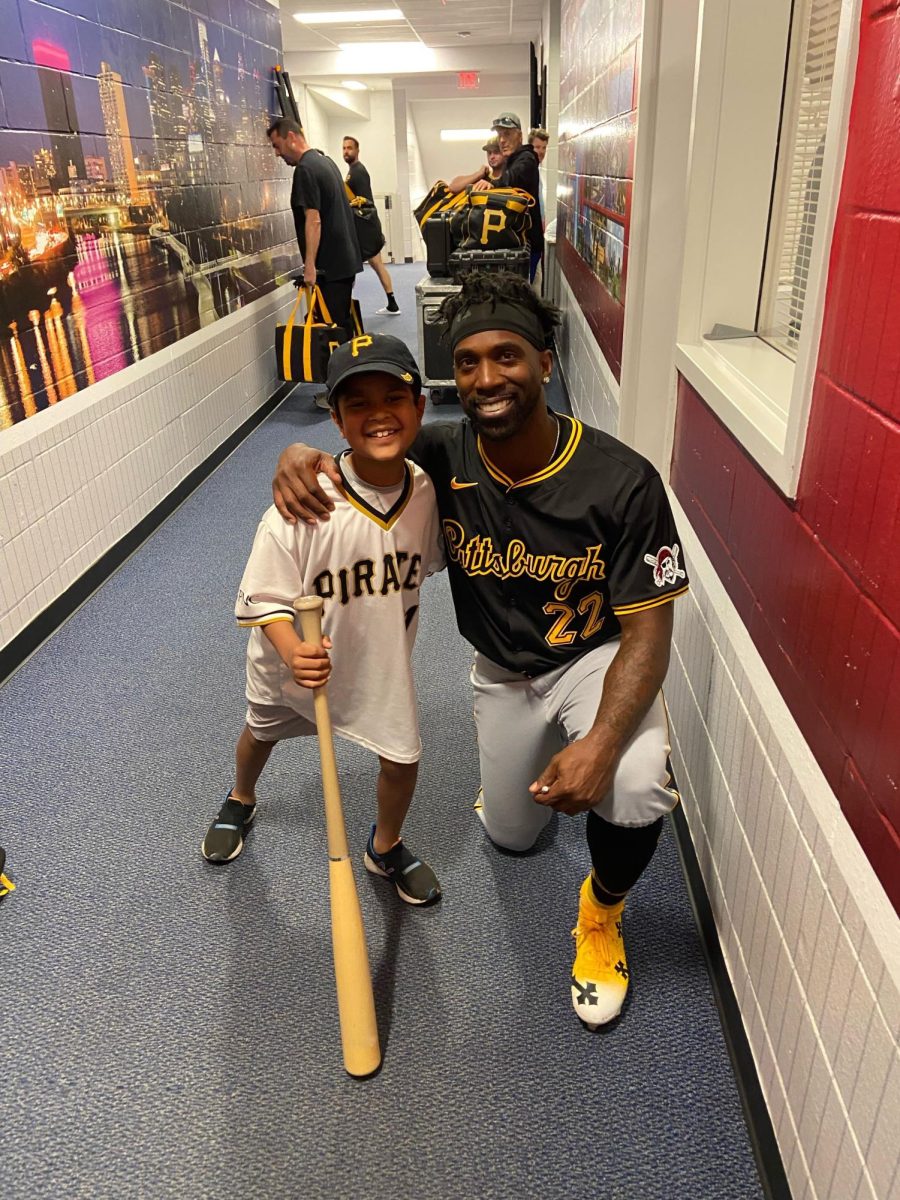Column: FIBA World Cup needs to change in order to truly matter
August 25, 2014
When Indiana Pacers star Paul George broke his right leg during a USA Basketball scrimmage in Las Vegas at the beginning of the month, one of the most popular reactions by sports fans was that it’s too risky to send top players to the upcoming FIBA World Cup in Spain.
NBA commissioner Adam Silver disagreed.
“Injuries can happen any place at any time. The experiences our players have enjoyed by participating in their national teams, however, are ones that are unique and special in almost every other way,” Silver said in an interview with ESPN.com.
Indeed, according to The New York Times, George’s setback was the first major injury to afflict a USA Basketball player while on international duty since 1992 — the first Olympics where professional players could participate. Over the last two decades, the United States has won the 24-team World Cup — formerly known as the “World Championships” — twice, finishing third two other times and sixth in 2002.
George, who will likely miss all of the 2014-2015 NBA season, was realistic about his situation.
“Freak accidents happen,” he said. “USA Basketball doesn’t deserve any criticism from this.”
Still, top players passing on the World Cup makes some sense for other, better reasons.
When evaluating this topic, the first question is, what do they have to gain from participating?
With the Olympics already established as the sport’s top international competition — the competition top players won’t skip — the FIBA World Cup in its current form has little purpose. Sure, it has twice as many teams as the Olympics — four years is a long time to go without meaningful international competition — and whoever wins it automatically qualifies for the 2016 Summer Games in Rio, but nothing sets it apart from the Olympics in a good way.
Only two of the 12 American players who went to London in 2012 — Anthony Davis and James Harden — will make the transatlantic trip this time.
But just saying that top players from America or anywhere else shouldn’t play in this event doesn’t solve the issue, nor is it necessarily correct.
The FIBA World Cup needs fixing to become respectable.
The current schedule is problematic. Taking place in Spain from Aug. 30 to Sept. 14, presumably to give players time to recharge from their pro seasons as well as to avoid competing with soccer’s World Cup for interest, the tournament leaves a small window between its conclusion and the start of NBA training camps start at the end of September. Plus, the regular season starts a month after that. The NBA Finals end in mid-June and the soccer World Cup runs from early June to early July.
There’s a way to make these events fit better in between the almost year-long timeframe of pro basketball. : Men’s basketball at the Olympics should take after how the men’s soccer competition works there — as an under-23 event with teams free to choose up to three overage exceptions. This change would free the World Cup to become what its name suggests it is, instead of being the equivalent of an American airport that calls itself “international” because it offers flights to Canada — a descriptor that’s technically true but not consistent with the common perception of ‘international.’
FIBA, basketball’s international governing body, could then move the event to a year without a blockbuster global summer sporting event each cycle, say 2015 or 2017.
As a result, the Olympics would be a showcase for the basketball’s young adult stars, something that’s needed. The closest thing that exists now is the NBA’s rookie vs. sophomore game during All-Star Weekend, a glorified pickup game at its best. FIBA championships go from the U-19 age group right to the normal national team.
And the game’s best wouldn’t have to worry about tiring themselves out by competing in a second tier event.
American superstar and reigning NBA MVP Kevin Durant withdrew his name from consideration for the final roster on Aug. 7, which was announced on Aug. 23, after George’s injury.
“This was an extremely difficult decision, as I take great pride in representing our country,” Durant said in a statement. “I know that I owe it to my USA Basketball teammates to be totally invested in the experience. After going through training camp with USAB, I realized I could not fulfill my responsibilities to the team from both a time and energy standpoint.
Durant was a member of the Olympic gold medal-winning squad in 2012.
“I need to take a step back and take some time away, both mentally and physically, in order to prepare for the upcoming NBA season,” he said. If the NBA regular season was, say, 50 games instead of the current 82, which is entirely too long anyway, players would have enough time after the end of the World Cup to rest up for the season ahead. And it would be done without having to resort to the abrupt periods that exist in soccer — “international breaks” for qualifiers and friendlies — or hockey with its two-week Olympic break.
“At this point, I don’t anticipate a major shift in the NBA’s participation in international competitions,” Silver said. “It seems clear, however, that this will be a topic at our next NBA competition committee meeting in September and our board of governors’ meeting in October and, of course, we will continue to evaluate the pros and cons of participating in international tournaments.”
Some owners, like Mark Cuban of the Dallas Mavericks, have made their opposition to the idea of players taking part in international competition clear.
“For some sports the Olympics are very, very important. For basketball, it’s meaningless. It’s not that they’re not decent games,” Cuban said in 2012. “All things being equal, it’s fun to watch us play Argentina and Spain but it would be just as fun if they were 21 and under.”
According to the ESPN.com story, Cuban’s answer to the international basketball dilemma is a quadrennial competition just for NBA players. This idea wouldn’t work. The only countries that would be able to field a team of five using players who were on NBA opening night rosters last year are the U.S., Canada, France and Spain. London 2012 bronze medalist Russia couldn’t take part, nor could other traditional powers like Argentina and Lithuania.
As a result, I don’t know how appealing Cuban’s dream scenario would be to a global audience. It also would be even less able to claim that it was the actual world championship. Instead, it’d just be another pointless international competition.
The FIBA World Cup will continue to be just that too, unless changes are made.








